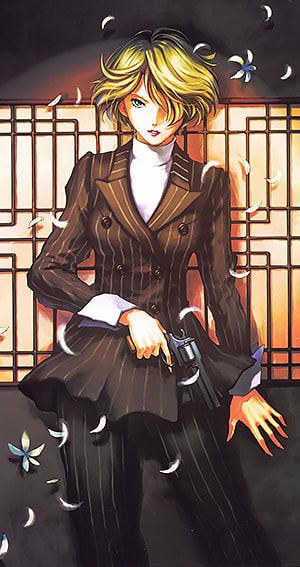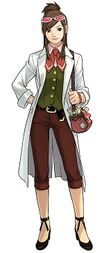Agent Jane
| Agent Jane | |
|---|---|
 Jane Meadows, depicted in the opening titles | |
| Genre | |
| Voices of |
|
| Opening theme | "He Never Came Back" by The Ventures |
| Ending theme | "Comanche" by The Centurions |
| Country of origin | Gylias |
| Original language(s) |
|
| No. of episodes | 50 |
| Production company(s) |
|
| Release | |
| Original network | GTV1 (1966–1970) GTV4 (1970–1972) |
| Original release | 2 May 1966 – 29 December 1972 |
Agent Jane is a Gylian animated series which aired on GTV1 and GTV4 in 1966–1972. Produced by Handiworks Animation and the Gylian National Film Institute, it is a spy fiction series depicting the adventures of Jane Meadows, an intelligence agent working for the Special Public Security Bureau 9.
It is one of Gylias' most successful animated series, playing a prominent role in the Gylian Invasion, and has been influential on Gylian pop culture.
Plot
The series follows the adventures of Jane Meadows, an intelligence agent with SPSB9. She is called upon to do undercover operations and covert operations, much of it counterintelligence in nature. She accordingly spends much time abroad, including in joint operations with other nations' intelligence agencies.
Much of the series' humour comes from the contrast between the appearance of Jane's glamorous, globe-trotting lifestyle and the realistic depiction of espionage and bureaucratic procedure. Besides the expected cover stories, Jane spends more time filing reports, completing paperwork, and requesting court orders for surveillance operations. She also attends hearings of the Permanent Committee on Intelligence and Security to answer questions regarding her missions.
Characters
- Jane Meadows
- Voiced by: Sia Reunu
- Jane is an intelligence agent and the central character. "Jane Meadows" is a code name; neither her real name nor her age are revealed in the series. She is intelligent, quick-witted, and charming, and has a license to carry a pistol, which she treats more like a penis metaphor than an actual weapon. She wears her blonde hair over her left eye as treatment for amblyopia and has a pinstriped suit she is highly fond of, wearing it almost all the time.
- The series' central irony is that Jane treats her work merely as a job. She only enjoys the opportunity to romance people during her missions, but otherwise cares more about reducing her workload and getting more rest time and vacations. Her lack of work ethic and sarcastic humour irritates her supervisor.
- Kythera "Kitty" Anti
- Voiced by: Seina Tymea
- Kitty works in the SPSB9 technical department, and spends her time thinking up various gadgets, which are invariably brought down to something more feasible or useful. Due to her youthful appearance, she is sometimes mistaken for a university student. She has an upbeat and enthusiastic personality, and a colourful fashion sense. She took her code name after the Antikythera mechanism; it is revealed in one episode that she is not actually Hellene, when guest star Alike Demetriou attempts to talk with her in Hellene.
- Kitty is Jane's best friend at work, and serves as her sidekick. She provides Jane with gadgets, and sometimes insists on joining her for missions. Jane sees Kitty as something of a younger sister, and the two spend much time chatting about their escapades and work gossip. She has an older sister, who is a member of the GSDF, and with whom she's very close.
- Ďef
- Voiced by: Teş Rynad
- Ďef is Jane's supervisor. He is older and has worked for SPSB9 "since it was SPSB1". His gruff, by-the-book personality contrasts greatly with Jane's more carefree demeanour. Ďef disapproves of Jane's attitude to work, but nevertheless has a soft spot for her, manifested in their good-natured banter, with Jane regularly mocking his grumpy demeanour and nicknaming him "Beard" due to his appearance.
Production
Agent Jane originated as a collective Handiworks Animation project. Spy fiction and action films were popular at the time, and a team formed in the studio to create their own take on the genre. The idea was brought to Gylian Television, where it won the enthusiastic support of Head of Programming Estelle Parker and Cecilia Parker.
The series was produced by Handiworks Animation and the Gylian National Film Institute between 1966 and 1972. Initially, it aired on GTV1, before moving to GTV4 after its establishment. "Jane Meadows" was chosen as the main character's name, punning on the idiom "plain jane", and led to similar punny code names throughout the series.
One mandate from the producers was that episodes begin and end with Jane "off the clock", in order to develop her characterisation and show her life outside of work. This inspired the central irony of Jane treating espionage as merely a job. One episode features a scene where Jane observes someone from a distance, and mutters, "Hurry up you fucker, I'm not delaying my lunch break for you…" The use of animation as a medium allowed the series to use all manner of exotic locales, and create a setting where mundane everyday life intersected with the fantastical depiction of international espionage.
Agent Jane featured a left-wing perspective on spy stories that helped it stand out within the genre. This was largely imposed by the practices of Special Public Security Bureau 9, which the creators thought provided a wealth of interesting details, particularly due to the tension between SPSB9's radical transparency and the demands of covert operations. Kitty's imaginative gadget designs being revised into something more prosaic poked fun at the exaggeration of spy fiction; much of Jane's work is carried out with simple methods, such as communicating through numbers stations.
In contrast to crazed supervillains seeking world domination, the series' villains were more prosaic: ruthless capitalists, authoritarians, political extremists, power-obsessed and petty officials. When confronting villains, Jane annoys them with incessant questions and insults that they're "only in it for the money"; by contrast, she charms or negotiates her way past low-level minions and lackeys by treating them sympathetically as overworked and underpaid victims of circumstance.
Soundtrack
The series famously eschewed creating an original soundtrack in favour of licensing existing songs for use. The soundtrack supervisor, Tasa Eşarle, was an avid fan of surf rock with a significant collection of surf rock albums. Surf rock thus became the foundation of the soundtrack.
For the psychedelic opening sequence, Tasa chose to use The Ventures' "He Never Came Back", from The Ventures in Space. The song was edited to fit the length of the sequence, removing the yells in the process. Its heavy beat and twangy, blues-influenced guitar riffs contributed significantly to setting the tone of glamorous, tongue-in-cheek action of the series. The end credits used The Centurions' "Comanche", whose jazz beat and saxophone riff provided a sultry, understated counterpoint.
Various songs were used in the soundtrack, some as specific cues:
| Artist | Song | Use |
|---|---|---|
| The Ventures | "He Never Came Back" | Opening credits. |
| The Chantays | "Wayward Nite" | Investigation scenes. |
| The Ventures | "Night Stick" | Investigation scenes. A particular favourite due to its lighthearted tone. |
| The Ventures | "Pedal Pusher" | Investigation scenes. |
| The Centurions | "Tuff Soul" | Characters wandering about town. |
| The Tornadoes | "The Inebriated Surfer" | Characters wandering about town. |
| Dick Dale and the Del-Tones | "Surfing Drums" | Characters wandering about town. Edited to remove the vocals; drum solo used separately. |
| The Challengers | "Roadrunner" | Jane enjoying the city. |
| The Ventures | "How Now Wild Cow" | Jane enjoying the city. |
| The Ventures | "Wack Wack" | Jane enjoying the city. |
| The Centurions | "Intoxica" | Action scenes. |
| Dick Dale and the Del-Tones | "Night Rider" | Action scenes. |
| The Chantays | "Retaliation" | Action scenes. |
| The Surfaris | "Big Surge" | Action scenes. |
| The Ventures | "Wild Trip" | Action scenes. |
| The Ventures | "Green Onions" | Jane sneaking into buildings. |
| The Ventures | "The Creeper" | Dramatic confrontations. |
| The Ventures | "War of the Satellites" | Dramatic confrontations. |
| The Hustlers | "Inertia" | Tense scenes. |
| The Rumblers | "Night Scene" | Tense scenes. |
| The Rumblers | "Volcano" | Tense scenes. |
| The Ventures | "The Bat" | Tense scenes. Used ironically, contrasting its aggressive sound with the prosaic villains of the show. |
| The Impacts | "Sea Horse" | Relaxed scenes. |
| The Ventures | "Peach Fuzz" | Kitty's theme; mainly used when she demonstrates gadgets to Jane. |
| The Ventures | "Wild and Wooly" | Jane's theme; mainly used when she hatches wild ideas or comically goes about her work. |
| The Centurions | "Comanche" | Closing credits. |
Tasa later recalled that the soundtrack's assembly was very low-tech: "I'd make tape copies of the songs we used, and had a tape player with a volume knob. I'd fade them in and out on cue. I generally preferred songs with wild reverb guitar and raunchy sax, since they seemed to fit Jane best." Some songs were also mildly edited, generally to shorten them or remove sections that didn't fit the action.
Licensing the songs was "remarkably easy", according to Tasa, particularly as they used more obscure instrumentals by bands that already tended to be one-hit wonders.
One notable departure from the surf rock-dominated soundtrack came in the last episode, which culminated in a lengthy infiltration and rescue sequence set to Pink Floyd's "Obscured by Clouds"/"When You're In".
Reception
Agent Jane was a significant critical and commercial success upon airing. It gained rave reviews for its action, stylish animation, and humorous scripts. Music journalist Mana Kirishima also noted that its use of surf rock, previously a craze that had popularised rock music in 1962, was transformative, harnessing the genre's sound to create a "cool and sultry" atmosphere rather than simply evoking the sport of surfing.
Agent Jane and Kleptechne became two of the leading animated series of the Gylian Invasion, earning a sizeable audience abroad. One commentator noted that the series' psychedelic sensibilities, rock soundtrack, and imaginative plots were "like nothing else on television in 1966". It also provoked controversy due to the difference between Gylian and foreign sensibilities, attracting criticism abroad for explicit content, particuarly regarding violence and sexuality.
The series had a major impact on Gylian pop culture. Jane Meadows became an archetypal action heroine: competent, quick-witted, and a sex symbol, the latter an aspect the series indulged by using her pistol mainly for visual double entendres. Later action cinema such as the works of Chikageki or Dreamwave Productions would build on the foundation of Agent Jane: Chikageki's characterisation earned comparison to the Jane–Kitty dynamic, while Dreamwave produced both self-admitted homages in Le recueil des faits improbables de Ryōko Yakushiji and Agent Aika and humorously exaggerated Jane's lackadaisical tendencies for Monster Squad's Jane Smith.
The series also found influence abroad, inspiring several imitators or filmmakers such as Roald Myren, who commented, "Agent Jane and Kleptechne taught me everything I know about 1960s cool."
One inadvertent effect of the series' production was an institutional tendency within GTV4 against opening and closing titles, which came to be regarded by some executives as overly self-indulgent or wasting the audience's time. This tendency was pronounced in the 1970s–1980s, when it was preferred that series simply begin in medias res while text credits appeared on screen understated, before abating in the late 1980s–early 1990s.


